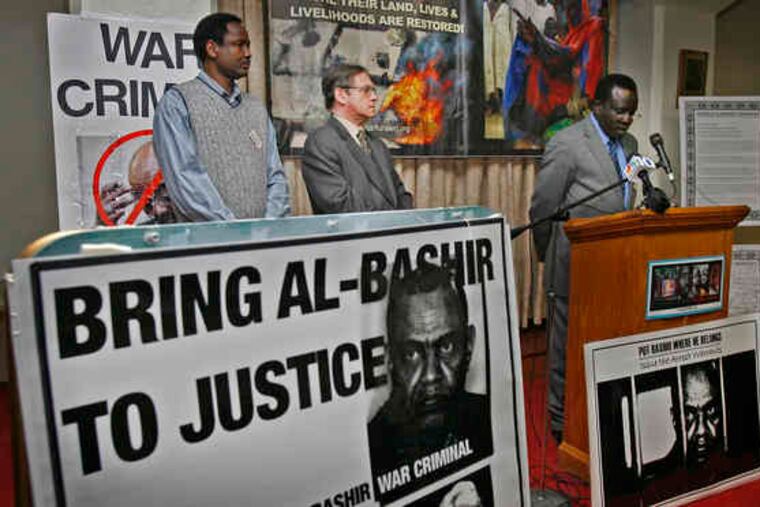Darfurians in Phila. region relieved by warrant
The arrest warrant issued for Sudanese President Omar al-Bashir yesterday by the International Criminal Court delivered some relief to Darfurians living in the Philadelphia region.

The arrest warrant issued for Sudanese President Omar al-Bashir yesterday by the International Criminal Court delivered some relief to Darfurians living in the Philadelphia region.
Many local Darfurians - about 700 Sudanese, 50 of them from Darfur, are in this region - hailed the decision.
"Today is a good day," Philadelphia social worker Ibrahim Hamid said at a news conference by the Darfur Alert Coalition, an area advocacy group of which he is an officer. The Darfuri native came to the United States after the Sudanese government targeted a group he belonged to in 1999.
The court accused Bashir of "intentionally directing attacks" against Darfur civilians since fighting broke out in the western Sudan region in 2003, leading to the deaths of up to 300,000 people and displacement of 2.7 million.
The warrant "sends a strong signal to dictators and tyrants that there will be no impunity," Hamid said. He added that international pressure will have to continue if Bashir, whose government says it will not cooperate with the court, is to end up at trial.
Ali B. Ali-Dinar sees a more practical impact. Dinar is associate director of the University of Pennsylvania's African Studies Center and president of the coalition.
"It creates another pressure point from the international community," Ali-Dinar said. His grandfather Sultan Ali Dinar was the last king of Darfur, ruling from 1898 until he was killed in 1916.
Some in Bashir's party might even try to improve their own prospects by turning him over to the court, Ali-Dinar said.
Darfurians still in Sudan's western region can't celebrate the court's decision, said Hamid, who called relatives in Darfur after the announcement.
Bashir's regime, anticipating the warrant, warned against antigovernment demonstrations, Hamid said.
"People over there are scared," he said. "They just told me that since they can't express their feelings, we can just celebrate on behalf of them here."
Ali-Dinar said the Sudanese government knows which Darfurians abroad speak out against it and threatens harm to relatives of such critics.
El Ghali Shegifat has been inside and outside Sudan recently. A journalist and president of the Association of Darfur Journalists, he came to Philadelphia in October after more than two months in a notorious Sudanese prison. He told his story last week through an interpreter.
He joined his sister in Philadelphia after a campaign led by the Darfur Alert Coalition to free him from prison.
Shegifat, 33, aches from experience with Bashir's regime. His compact body gestured and the sunglasses he put on when having his photo taken betrayed a wariness he carried over from Sudan.
He was among the first to report government attacks and cultivate rebel contacts. Government authorities let Shegifat's editors know they didn't like his reporting. When supervisors told him to stop covering the fighting, he moved to other newspapers.
Shegifat doesn't claim to be objective about the violence in his homeland.
"The government looks at the Darfur people as second-class citizens," he said.
He was arrested three times, the last in May 2008, not long after a rebel group fought with government troops outside the capital of Khartoum.
Shegifat described being kicked, punched, and beaten with chains as interrogators asked him about his relationship to rebels who had come to Khartoum's outskirts.
"I convinced myself," he said, "that whatever is going to happen is going to happen, and I'm no better than the 300,000 killed in Darfur."
Mohamed Mohamedein, 18, and his sister, Hager, 12, were born in Saudi Arabia to Darfuri natives. The family moved back to Sudan before coming to the United States in 2000, but they have seen the dead of Darfur.
In 2007, they were on a bus in Darfur with their parents after visiting the village where their father was born when they saw helicopters overhead and soldiers on the ground. Villagers were running, screaming, bleeding, Mohamed recalled.
"I just wanted to get away," he remembered thinking at the time. "I'm not made for this."
Because the bus was headed to the closest town with a hospital, wounded men were loaded onto the bus.
"I saw dead people and then I saw people with guns, then I saw people rushing to the bus, and I saw injured people," Hager said. "I was shocked. I was like, 'What is going on?' I started crying; I didn't know what to do."
Mohamed tried to comfort her back then by saying everything would be OK.
Yesterday, she was still hoping it would be.